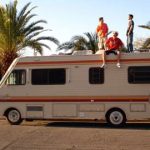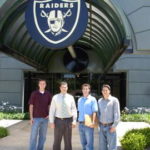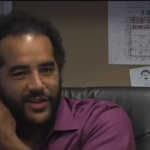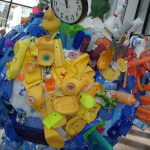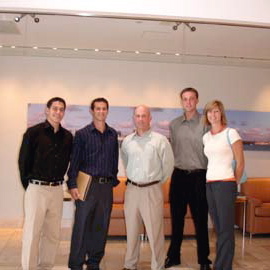 I’ll try to give you the short version. I grew up around the game. My dad played minor league baseball and then scouted for the Cincinnati Reds for seventeen years. So I was born in Pennsylvania, and my dad had different areas around the country, so we moved around. I lived in Colorado, grew up in Austin, Texas. So it’s like being in the military. You grow up around it, you move around a lot, and then you end up going into it yourself.
I’ll try to give you the short version. I grew up around the game. My dad played minor league baseball and then scouted for the Cincinnati Reds for seventeen years. So I was born in Pennsylvania, and my dad had different areas around the country, so we moved around. I lived in Colorado, grew up in Austin, Texas. So it’s like being in the military. You grow up around it, you move around a lot, and then you end up going into it yourself.
We would travel with my dad during the summer and I knew, based on the talent he was looking at, I wasn’t good enough to play pro ball. I played in high school. I was going to play in junior college, but I knew that I wasn’t good enough to go beyond college.
What I started doing after graduating from high school in Texas, and when I was going to junior college in Maryland, I started as an intern for the Baltimore Orioles. I was working in their scouting and player development department. This was back in 1986 when computers were just coming into baseball.
So my first job as an intern was to sit at a computer terminal and enter scouting reports. I did that for two years. What happened was that the front office let everyone who was involved in baseball operations go. But I was so low on the totem pole that I was able to hang on. I was the only person who knew how the office worked, so I was hired full time as an assistant in the scouting department. I was twenty, right after my second year of junior college.
After a couple years of that, the job turned into going out and evaluating players. Cross checking amateur players around the country and evaluating the minor league system. I ended up moving to the assistant director of scouting there for about three years.
Then I had an opportunity in 1995. One of the owners of the Orioles came out to San Diego, Larry Luchino, to be the president of the Padres. So I came out here, as a special assistant to the general manager. That was a lot of scouting.
After a year of doing that, I ended up as assistant general manager. I’ve been the assistant general manager for ten years.
I knew what I wanted to do when I was five years old. I wanted to play. But by fifteen or sixteen, I realized I didn’t have the ability. And so I started at looking at other avenues that would allow me to continue to stay in the game.
The thing about what I do, is that you get to meet so many different people and have so many different experiences. From when I was scouting to today, every day is literally something different. (phone rings)
That was Brian Johnson. He used to play for the San Francisco Giants. Now he lives in Detroit running a mortgage banking business there and he’s making a presentation to our players. That’s kind of the cool thing is that you develop so many different relationships and meet people from all walks of life. Yet get to have an impact on people’s lives, both positive and negative, in terms of helping a player develop through the minor leagues and into the major leagues. But you can also have a negative impact in the fact that you make a trade or you release a player…it’s probably the worst part of the job. When you have to tell a player he’s no longer a member of the Padres.
You’ve done a lot of scouting. What do you look for in a player?
You look for skill sets at different positions. At catcher you want someone who can receive, can call a game, has good hands, and can throw. So you look for the skill sets and what we call “make up.” Their attitude, both on and off the field. What kind of character they have. And you look for desire. Someone who really wants to play and move up and doesn’t view this as the next step. You want someone whose goal isn’t to play in Double A, but someone who wants to get to the big leagues. And you want someone who is willing to work and do whatever it takes to get there.
A lot of determining a players worth is where they’re taken in the draft. A first round selection would get anywhere from $3 million to $800,000. Really, it’s their value in what they receive in their bonus is where they’re selected in the draft.
We try to have a balance of statistical analysis along with our scouting reports. We’ve got scouts all over the country that are looking at players throughout the minor leagues.
A lot of what this room is used for is statistical analysis. We got people in here that do the statistical analysis on players, and we’ll combine that with our scouting reports. It’s our job to make good decisions based off of that information.
What’s the work day like?
It varies between the off season and the regular season. During the season, we’ll come in, especially when the team is home, we’ll come in a little bit later. Close to 9:30 a.m. because sometimes we’re here until 11 or 12 o’clock at night.
What I’ll do is I’ll come in, check our minor league game reports. We’ve got five, actually four minor league teams that are playing. We’ll eventually have six. So I’ll go through the minor league game reports and see what they did the night before. Then I’ll handle any issues that relate to our major league team based on the night before. I may have to make a player move if a player got hurt. I’ll address that with Kevin Tower, our general manager. We’ll take care of putting a player on the disabled list and getting a new player here for that night’s game. In the afternoon we go down and take care of any issues going on in the clubhouse. We meet with our trainers, our coaching staff, before they go out on the field at about three o’clock. From 3 p.m. to 5 p.m. is when Kevin and I can go work out. We either walk or run or do something just to sort of, get away.
Then we’ll come back and watch the game. We sit up in the box and watch the game. We’re evaluating as the game is going on. After the game you got to go back down to the clubhouse to make sure everybody is healthy, and to see if there are any player moves you have to make the next day.
That’s when the team is in town. When the team is out of town, I get in about 8:30 a.m. I leave about 5:30 and go home. I’m not with the team now, so I’ll watch the game on television. Tomorrow, I’ll fly to Seattle to meet the team there. Kevin is with them right now. We’re splitting the trip up. I’ll be up in Seattle with the team for the next four days.
Who do you take the most pride in discovering?
I was never an area scout. So the area scouts are really the guys who are the most valuable people on your scouting staff, because they’re the ones that go out and discover these players. They’re sort of the first line in terms of the first people to send in a report. I was never an area scout, I started cross checking. So what I would do is go in after an area scout would turn in a player and I’d give a second opinion.
I think the player that, again, I didn’t discover Mike Mussina, but I was associated as the assistant scouting director. I saw Mike his junior year at Stanford when we selected him with the twentieth pick in 1990. A lot of teams passed on him in that first round. They were worried about his elbow. We ended up taking him, and he’s had a pretty good career. (phone rings) This is our traveling secretary. Hold on.
What’s the key to achieving the level of success you’ve achieved in baseball?
In order to have success in anything, you’ve got to have a passion. You have to have a desire. You have to enjoy what you’re doing. There are times in my day where I sit there and where I rather be doing something else. But when you look at the big picture, 365 days a year, I love what I do.
If I weren’t able to do this, I’m not sure what else I would do. It’d probably involve being associated with baseball in some way or fashion. The one thing you have to do is love what you do and have a desire to learn and to grow.
There are going to be times where you’re going to be unhappy. And you’ll ask yourself, “What am I doing here?” If you love what you’re doing, you’ll move beyond that and work through the bad times.
My dad was my role model. He did what I wanted to do. He played in the minor leagues and then scouted. He was the guy that was associated with baseball and he was the person that I wanted to be like.
There are a lot of people early on in my career that were helpful. Roland Heman, who was the general manager with the Orioles. He was helpful, he’s now with the White Sox. Doug Melvin, the general manager to the Brewers. Larry Luchino who is the president of the Red Sox. (phone rings) Can I call you right back? I’ll call you right back. Larry was the guy that gave me the opportunity to come to San Diego. He was with us in Baltimore and came out here.
You come across people every day. The one thing I enjoy doing more than anything is reading. I try to read a lot of non-fiction, biographies of people that are successful, not necessarily in sports, but business, baseball, whatever. I just try to learn and take something from each one of those people.
What have you learned that school didn’t teach you?
In what I do, not necessarily in this business, but in my job, it’s honesty. You have to be honest with people whether it’s the employees you supervise- the other baseball operations personnel- but even more so than that, the players. We deal with players every day. If you’re not honest with them, they’re going to know. They’re really good at reading people. If you’re going to tell a player that you’ll be sending out from Spring Training to Triple A, but that he’ll be up by May 15th, you can’t do that. You want to make him feel good, but you have to be honest and up front. To me, in any type of business, just being honest with people that you work with, that you supervise, or that you deal with on a day to day basis, I think honesty is the biggest thing.
Baseball is a transient game. If you’re a player you get traded. If you’re a scout you move around to different areas and maybe different teams. If you’re in the front office, it’s very volatile.
I was fortunate to be with Baltimore for eight years. And I’ve been in San Diego for eleven. I’ve been fortunate. I’ve always said, when I came to San Diego, when I get fired, I’m not going anywhere else. I’m just going to sell surfboards. I love San Diego.
If I’m no longer able to work for the Padres, which…it’ll happen someday. Everybody in baseball will get fired. There can be a change of ownership. There can be a change of general managers. So it will happen, and I’m prepared for that. But I’d like to stay associated with baseball and still be able to live in San Diego, whether that be as a player agent or a scout based out of this city.
I see myself here in San Diego, hopefully working for the Padres.
A lot of people in my position have goals and aspirations to be a general manager. I don’t. That’s not because I’m not motivated. With my personality and the way I am, I’m best suited to be the guy behind the scenes that makes things go. Kevin is a guy that’s better out in front, talking to the media, talking to the public. I like to be behind the scenes.
How do you overcome the bad moves, the failures, and what’s a specific story?
(Pause) Well, I don’t want to say it was a bad move, but there are times when we’ve claimed a player off of waivers that for whatever reason, it just doesn’t work. We claimed one particular player who had a large contract when we were going into the postseason. He pitched for us the rest of that year, but still had another year on the contract. He was injured the entire year. Things like that get you down. But you have to look at the positive. We claimed him and we got to the World Series. And he helped us, in some way. And then he wasn’t able to pitch the following year. Even though moves don’t always work, that one did in a way because he helped us get to the World Series.
Always try to look at the positive. If you make a move that doesn’t work out, you just learn from your mistakes. That’s why we combine the statistical analysis with our scouts opinions so that we can cut down on the number of mistakes that you make. We’ve made mistakes, but we’ve also…
For example, after the ’97 season we traded Derek Lee. You know, he’s an All-Star. He’s hurt right now with the Cubs but he’s a great hitter. He was in Triple A and had a little bit of time with us in the big leagues, but we traded him to the Marlins for Kevin Brown. If we didn’t have Kevin Brown, we wouldn’t have gotten to the World Series in ’98. And we had to get to the World Series in ’98, because we had to get PetCo Park built. Because there was a huge vote four days after the ’98 season to see if San Diego would allow this park. And if we hadn’t gotten to the World Series, the Padres may be in Northern Virginia.
We no longer have Kevin Brown. He signed a huge contract with the Dodgers at the end of that one year. But he did help us get to the World Series, and now Derek Lee is in Chicago having a great career. So we would still do it all over again. If we would have held on to Derek Lee, we probably wouldn’t be in San Diego because PetCo Park wouldn’t be built, and we’d be in Northern Virginia.
Do friends tell you what you’re doing wrong?
I hear it all the time from friends. The good thing about my family is that my dad was in the game, so he understands. And my mom is a huge fan. She still watches all the games on cable. They understand what I go through. But I hear it everywhere I go. The Starbucks in my neighborhood. You go out to lunch around here. It’s good, because we’ve been playing well lately. So things have been positive. When things were poor early in the season, you get your Starbucks and you get out.
Get in as soon as possible with an internship. Whatever field you want to get into, get into it as early as possible. Emmerse yourself in all aspects of whatever it is you want to get into.


